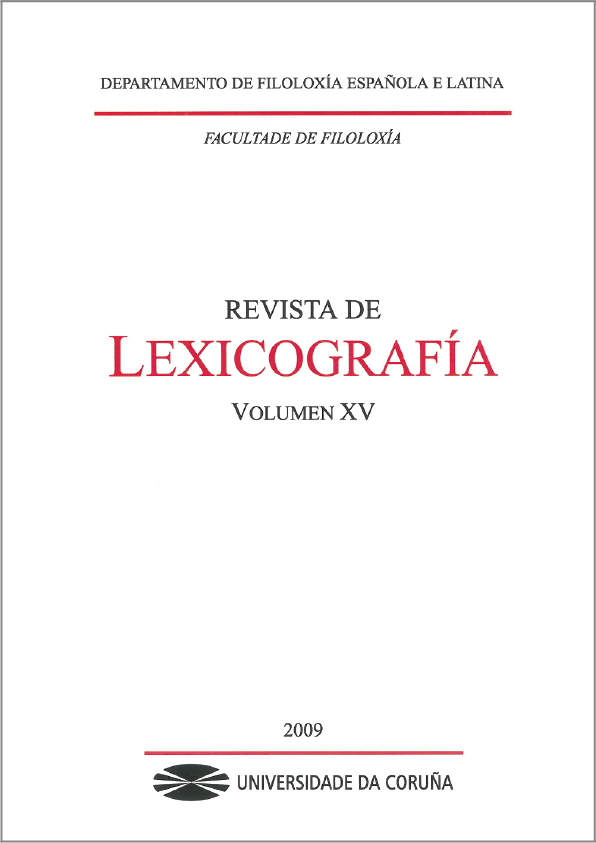Proposals for Upgrading the Lexicographical Treatment of Prepositions in Bilingual Dictionaries for Business Translation
Main Article Content
Abstract
Keywords:
Downloads
Article Details
References
DICTIONARIES
Dictionary of Lexicography (1998): R. R. K. HARTMANN and Gregory JAMES, Dictionary of Lexicography, NewYork, Routledge.
Oxford Business Spanish Dictionary (2002): Sinda LÓPEZ and Donald WATT, Oxford Business Spanish Dictionary, Oxford, Oxford University Press [OBSD].
OTHER LITERATURE
Abell, Alicia (2003): Business Grammar, Style & Usage: A Desk Reference for Articulate & Polished Business Writing & Speaking, Boston, Aspatore Books.
Bargalló Escrivà, María (2001): «La Información Gramatical en los Diccionarios Especializados», in M. Bargalló Escriva, E. Forgas, C. Garriga, A. Rubio, and J. Schnitzer, eds., Las Lenguas de Especialidad y su Didáctica, Tarragona, Universitat Rovira i Virgili, pp. 81-90.
Bell, Roger T. (1991): Translation and Translating: Theory and Practice, London-NewYork, Longman.
Bergenholtz, Henning and Uwe Kaufmann (1997): «Terminography and Lexicography. A critical survey of dictionaries from a single specialised field», Hermes. Journal of Linguistics, 18, pp. 91-125.
Bergenholtz, Henning and Jette Pedersen (1994): «Grammar in Bilingual LSP Dictionaries, with a Special View to Technical English», in B. Schaeder and H. Bergenholtz, eds., Fachlexikographie. Fachwissen und seine Repräsentation inWörterbüchern, Tübingen, Gunter Narr Verlag, pp. 351-383.
Bergenholtz, Henning and Sven Tarp (2002): «Die Moderne Lexikographische Funktionslehre. Diskussionsbeitrag zu neuen und alten Paradigmen, dieWörterbücher als Gebrauchsgegenstände verstehen», Lexicographica. International Annual for Lexicography, 18, pp. 253-263.
Bergenholtz, Henning and Sven Tarp (2003): «Two Opposing Theories: On H.E.Wiegand’s Recent Discovery of Lexicographic Functions», Hermes. Journal of Linguistics, 31, pp. 171-196.
Bergenholtz, Henning and Sven Tarp (2004): «The Concept of Dictionary Usage», Nordic Journal of English Studies, 3, pp. 23-36.
Bergenholtz, Henning, Sandro Nielsen and Sven Tarp, eds. (2009): Lexicography at a Crossroads: Dictionaries and Encyclopedias Today, Lexicographical Tools Tomorrow, Bern-Berlin-Bruxelles- Frankfur t am Main-New York-Oxford-Wien, Peter Lang (= Studies in Language and Communication, 90).
Biber, Douglas, Stig Johansson, Geoffrey Leech, Susan Conrad, and Edward Finegan (1999): Longman Grammar of Spoken and Written English, London, Longman.
Bogaards, Paul andWillen van der KLOOT (2001): «The Use of Grammatical Information in Learners’ Dictionaries», International Journal of Lexicography, 14, 2, pp. 97-121.
Corpas Pastor, Gloria, ed. (2003): Recursos Documentales y Tecnológicos para la Traducción del Discurso Jurídico (español, alemán, inglés, italiano, árabe), Granada, Comares.
Cowie, Anthony P. (1989): «Information on Syntactic Construction in the General Monolingual Dictionary», in F. J. Hausmann, O. Reichmann, H. E. Wiegand, and L. Zgusta, eds., Wörterbücher, Dictionaries, Dictionnaires. An International Encyclopedia of Lexicography. First Volume, Berlin-NewYork,Walter de Gruyter, pp. 588-592.
Cowie, Anthony P. (1999): English Dictionaries for Foreign Learners: A History, Oxford, Oxford University Press-Clarendon Press.
Dziemianko, Anna (2006): User-friendliness of Verb Syntax in Pedagogical Dictionaries of English, Tübingen, Max Niemeyer (= Lexicographica Series Maior, 130).
Faber, Pamela and Catalina JIMÉNEZ HURTADO (2004): Traducción, Lenguaje y Cognición, Granada, Comares.
Fuertes Olivera, Pedro A., ed. (2007): Problemas lingüísticos en la traducción especializada, Valladolid, Universidad de Valladolid (= Filología y Lingüística, 66).
Fuertes Olivera, Pedro A., ed. (2010): Specialised Dictionaries for Learners, Berlín-NewYork, De Gruyter (= Lexicographica Series Maior, 136).
Fuertes Olivera, Pedro A., and Ascensión Arribas-Baño (2008): Pedagogical Specialised Lexicography. The representation of meaning in English and Spanish business dictionaries, Amsterdam-Philadelphia, John Benjamins (=Terminology and Lexicography in Research and Practice, 11).
Fuertes Olivera, Pedro A. and Sandro Nielsen (2008): «Translating politeness in bilingual English- Spanish business correspondence», Meta 53, 3, pp. 667-678.
Fuertes Olivera, Pedro A. and Sven Tarp (2008): «La Teoría Funcional de la Lexicografía y sus consecuencias para los diccionarios de economía del español», Revista de Lexicografía, XIV, pp.75-95.
Herbst, Thomas (1989): «Dictionaries for Foreign Language Teaching: English», in F. J. Hausmann, O. Reichmann, H. E.Wiegand and L. Zgusta, eds., Wörterbücher, Dictionaries, Dictionnaires. An International Encyclopedia of Lexicography. First Volume, Berlin-NewYork,Walter de Gruyter, pp. 1379-1385.
Herbst, Thomas (1999): «Designing an English Valency Dictionary: Combining Linguistic Theory and User-friendliness», in T. Herbst and K. Popp (eds.), The Perfect Learners’Dictionary (?), Tübingen, Max Niemeyer, pp. 228-253 (= Lexicographica Series Maior, 95).
Jackson, Howard (1985): «Grammar in Dictionaries», in R. Ilson, ed., Dictionaries, Lexicography and Language Learning, Oxford, Pergamon Press and the British Council, pp. 53-59.
Laurén, Christer (1993): Fackspråk. Form, innehål, funktion, Lund, Studenterlitteratur.
Lindemann, Magarete (2000): «Vorüberlegungen zur einem französisch-deutschen Wörterbuch der Fachsprache derWirtschaft», in H. E.Wiegand, ed., Germanistische Linguistik, 151-152, pp.173-214.
Mugdan, Joaquim (1989): «Grammar in Dictionaries of Languages for Specif ic Purposes (LSP)», Hermes. Journal of Linguistics, 3, pp. 125-142.
Nielsen, Sandro (1999): «Mediostructure in bilingual LSP dictionaries», Lexicographica, 15, pp. 90-113.
Nielsen, Sandro (2003): «Changes in dictionary subject matter», in Herbert Ernst Wiegand, ed., Untersuchungen zur kommerziellen Lexikographie der deutschen Gegenwartssprache I. «Duden. Das große Wörterbuch der deutschen Sprache in zehn Bänden», Tübingen, Max Niemeyer Verlag, pp. 109-115 (=Lexicographica Series Maior, 113).
Nielsen, Sandro (2008): «The Effect of Lexicographical Information Costs on Dictionary Making and Use», Lexikos, 18, pp. 170-189.
Nielsen, Sandro and Sven Tarp, eds. (2009): Lexicography in the 21st Century. In Honour of Henning Bergenholtz, Amsterdam-Philadelphia, John Benjamins (= Terminology and Lexicography in Research and Practice, 12).
Nord, Christiane (2005): Text Analysis in Translation. Theory, Methodology, and Didactic Application of a Model for Translation-Oriented Text Analysis, Amsterdam-NewYork, Rodopi.
Rundell, Michael (1998): «Recent Trends in English Pedagogical Lexicography», International Journal of Lexicography, 11, 4, pp. 35-53.
Tarp, Sven (2008): Lexicography in the Borderland between Knowledge and non-Knowledge. General Lexicographical Theory with Particular Focus on Learner’s Lexicography, Tübingen, Niemeyer (= Lexicographica Series Maior, 134).
Tono, Yukio (1986): «A Scientif ic Approach to Lexicography», LEO. Journal of the Linguistics, Literary and Educational Organization, 15, pp. 37-53.
Wiegand, Herbert Ernst (2000): «Wissen, Wissensrepräsentation und Printwörterbücher», in U. Heid et al., eds., Proceedings of the Ninth EURALEX International Congress, EURALEX 2000, Stuttgart, Germany, August 8th-12th, 2000, Stuttgart, Institut für Maschinelle Sprachverarbeitung,Universität Stuttgart, pp. 15-38.
Wiegand, Herbert Ernst (2005): «Angaben, funktionale Angabezusätze, Angabetexte, Angabestrukturen, Strukturanzeiger, Kommentare und mehr. Ein Beitrag zur Theorie der Wörterbuchform», Lexicographica, 21, pp. 202-344.


